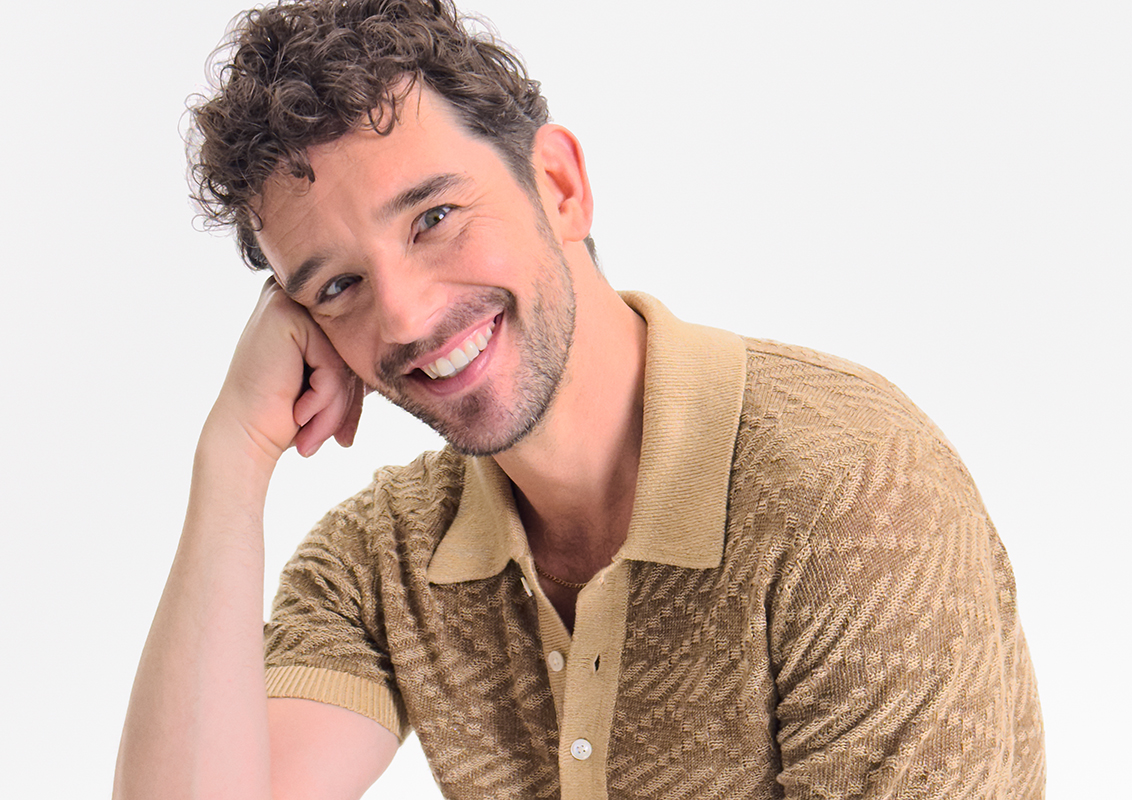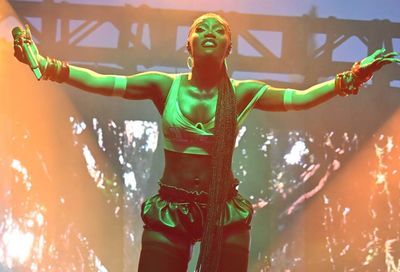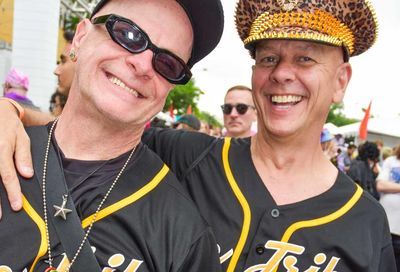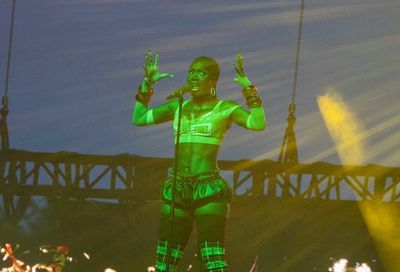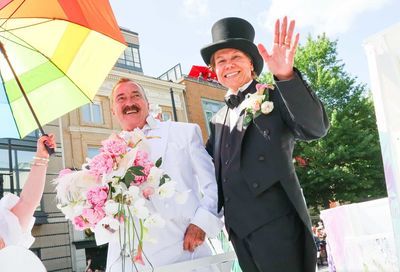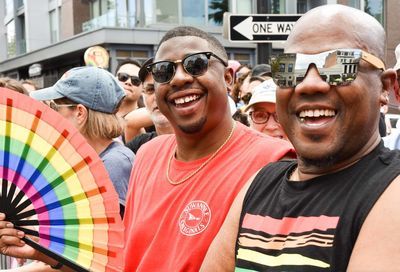Beam Me Out!
George Takei's Tales from Sulu to Stern
Update — Watch Metro Weekly’s video interview from October 2010:
Floating through space — further from us than Mars, but not so far as Jupiter — there is a large piece of rock making its perpetual rounds. Since late 2007, this asteroid has carried a name beyond a sterile label of numbers and letters. About 5 miles in diameter, ”7307 Takei” makes its home in the heavens where no one has gone before.
In fiction, however, the bounds of our solar system would have been as near as the backyard for Hikaru Sulu of the iconic Star Trek franchise. But for the actor behind Sulu, George Takei, there has been plenty of new territory to discover lately right here on Earth.
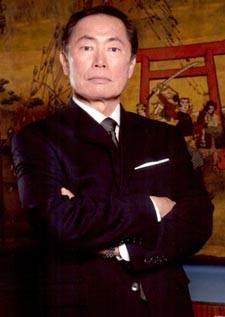
George Takei
Though out as a gay man for many years to friends and family — having a same-sex partner, Brad Altman, for more than two decades tends to let the cat out of the bag — Takei came out in a much more public way, speaking to Los Angeles-based Frontiers magazine in 2005. That’s just one small step in Takei’s millennium march. Beyond his asteroid and big coming out, Takei has taken on a recurring spot on Sirius Satellite Radio’s Howard Stern Show. And look over there! He’s grabbed a spot on NBC’s hit, Heroes. He’s thrown his rising gay star behind the Human Rights Campaign, and has even celebrated his public gaiety by roasting William Shatner, a.k.a. Capt. Kirk, on Comedy Central with such unforgettable lines as, ”Bill, your acting is the only thing that makes me want to gag. If I could only get my partner to suck that hard, I’d never want to leave my chateau.”
A good roasting, of course, is just about the laughs. Takei has more to him than that. In a conversation, he’s gracious, open and refreshing. His personal history has its share of tragedy: Takei and his family were taken from their Los Angeles home at the start of World War II, forced to spend the duration of the war in an internment camp in Arkansas. His aunt and baby cousin perished in Hiroshima during the war. Beyond the tragedy, there is a brand of patriotism and humanism that led him to march with Martin Luther King Jr. and to serve as chairman emeritus for the Japanese American National Museum.
Takei, who will be in our neck of the galaxy next week, from Jan. 17-20, as a guest of the Baltimore Symphony Orchestra, enhancing four evenings of sci-fi themed orchestral presentations with his velvety voiced narration, even has room left over for more Trekking, appearing in an online fan series that picks up where the original series left off. And he seems excited that an upcoming movie based on the original series will include Sulu, even if he doesn’t have the part. (The role is being played by John Cho of Harold and Kumar fame.)
”It’s a younger Sulu,” he says. ”As a matter of fact, he has some bravura heroics in this movie coming out. We know that Sulu’s passion is fencing and there’s a lot of fencing going on.”
METRO WEEKLY: With all that you’re doing these days, are we going through a sort of George Takei renaissance?
GEORGE TAKEI: The Age of Renaissance is it? Well, I am enjoying it, I must say. They say in this business that when someone isn’t employed, they’re between engagements. Well, I don’t like to be un-engaged, so I make my own engagements. Being active produces activity. I’m enjoying everything I’m doing. And then in a few days we’re off to Baltimore. That’s why you’re calling, right?
MW: Indeed.
TAKEI: Shortly thereafter, we go to Orlando for a — what else? — a Star Trek convention. I like to keep myself engaged.
MW: Is the sci-fi theme a bit old hat for you? Do you mind the constant association?
TAKEI: I find sci-fi to be one of the most important literary genres. Obviously, I’m very much associated with it because of Star Trek. When you stop to think about it, Star Trek came on back in the 1960s and all the technology on the show was complete science fiction.
We had one amazing sci-fi device that we wore on our hips that we could flip open and start talking. That was amazing science fiction back then. Today it’s a very real nuisance in our lives. It takes science fiction to set benchmarks in the future for the inventors, the innovators and the technologists to aim for. Without science fiction, you don’t have that.
MW: Speaking of Trek, you still seem to be very much on the go, traveling frequently.
TAKEI: Star Trek has given me the opportunity, if not trekking the galaxy, to at least trek this planet. I’ve been able to go to places where I never thought I’d be, or to places I never wanted to be. I’ve made wonderful discoveries like Montana. I’m an architecture buff and some of the architecture of Helena, Mont., was absolutely fascinating.
I discovered New Orleans, which is a wonderful place, and Portland, Maine, places I never thought I’d be going to, thanks to Star Trek conventions. Or basket-case cities like Detroit, which I would have avoided, but a Star Trek convention took me there. Being an urbanist, I do enjoy great cities: Paris, Kyoto, London, New York, Chicago. But I also am fascinated by basket-case cities to study what makes them basket cases, what makes them failures as urban civilizations.
I served on the board of directors of the Southern California Rapid Transit District and went to many transit conferences. That took me to places like Spokane, Wash. I’ve been there many times on transit missions.
So I have been very lucky in that respect. I enjoy travel. I’m a history buff, an urbanist, and I also I love the outdoors.
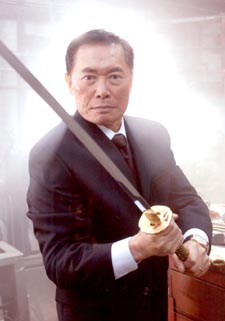
Takei from ‘Heroes’
MW: With the transit role in L.A., you had a role in bringing the subway to Los Angeles, didn’t you?
TAKEI: I was an active advocate for building the subway. When we started construction, I thought, ”I’m a good public servant, but I also have to maintain a professional career.” I went to Mayor Bradley and said, ”An actor doesn’t have to be wildly popular, but he cannot afford to be hated. And if you’re blocking traffic or impacting retail areas with construction work….” I didn’t want to see [picket] lines in front of my home saying, ”You’ve ruined my business” or ”You’re destroying our neighborhood.” So I resigned after 11 years. And how right my antennae were, because there were all sorts of disasters during construction. There were no injuries, but there were incredible cost overruns.
MW: Well, as oil crosses the $100-per-barrel mark, I suppose it was a great investment.
TAKEI: It’s vital to the mobility of our city. And people are now discovering, in fact, our urban planning is developing in concert with our subway system. We have new retail and condo and apartment projects going up at our subway stations. Hollywood and Vine is going to get a W Hotel. At Vermont and Wilshire, we have a major residential complex going up. That makes sense. You wake up in the morning, take your elevator ride straight down to the subway station, then take the subway downtown where all the offices and jobs are.
MW: You have had a hand in the future.
TAKEI: That’s right. That’s what I mean about science fiction being an important genre. You give people a peek into what our lives are going to be like.
MW: Looking at the social angle of sci-fi, take the interracial kiss between Capt. Kirk and Lt. Uhura. Did you realize that was groundbreaking at the time? Were you proud to be part of it?
TAKEI: Absolutely! I was involved in the civil-rights movement at that time. That was a real breakthrough for television. That episode was blacked-out in the South, places like Mississippi, Alabama, Georgia. It wasn’t aired there.
MW: More recently, the mid 1990s, there was an effort to get a gay character onto Voyager or Deep Space 9, I believe.
TAKEI: I remember having a discussion with Gene Roddenberry. He was an extraordinary man, a real visionary. He used to tell the Star Trek cast frequently that the Starship Enterprise was a metaphor for Starship Earth. And the strength of the starship was its diversity, the crew coming together and working in concert. You saw not only the visual diversity of race and ethnicity, but we had a Russian at the time of the Cold War, when we were mortal enemies. We had a Russian as a trusted member of the team. [Roddenberry’s] view was that even that kind of adversarial position — intense, fierce adversarial position — can be overcome. The irony is today we have the International Space Station, a spacecraft out there, and once-mortal enemies, Russians and Americans, are working side by side.
Gene was truly an enlightened person, and he said, ”It’s silly, this homophobia and all this legislation and prejudice against equality.” But he felt that in order to make the statements that he had been making on Star Trek, it was important for Star Trek to be on, and network television is the most conservative medium of communication. If he pushes the envelope too far, the envelope gets burned up.
MW: James Doohan, ”Scotty,” was asked by a fan at a convention if he thought that would be a good idea. I believe he responded with a curt ”No,” and that was that. Did you find him to be homophobic?
TAKEI: Oh, he was a great guy. We’d had him over for dinner and he’d had us to dinner at his place. He was not homophobic.
MW: Despite no gay characters, the nuance of inclusiveness must have gotten through, as Star Trek‘s gay following seems huge.
TAKEI: It’s been huge! They get the idea of diversity. We can all be part of this larger society and make our own unique contributions. That was Gene’s philosophy. Unfortunately, Gene passed away after The Next Generation was put together. The Next Generation was still with Gene’s participation, but after his passing a different group of people took over and they did not necessarily share Gene’s humanistic philosophy. David Gerrold, who wrote the script for ”The Trouble with Tribbles,” wrote a gay script, which he wanted to have done on The Next Generation. But that couldn’t be done because of the temper of the times. However, that script now has been filmed and is being put together by the fan manifestation of Star Trek [Star Trek: New Voyages].
MW: If you’d been as publicly out in the 1990s as you are now, do you think producers and writers would have evolved the Sulu character into a father and made him a captain?
TAKEI: Well, that’s an iffy question, isn’t it? They knew I was gay, but I was not talking to the press. So I don’t know. It’s kind of tantalizing. But I do think that my character, becoming a father and becoming a captain, I’d like to think that would’ve been possible. Some of the people knew [I was gay], but they still made my character grow the way it did. If I had talked to the press back then, I don’t know. It’s a big if.
MW: One job that being openly gay may have helped you get is the recurring spot on the Howard Stern Show.
TAKEI: Well, they played a prank on me. Artie Lange did.
MW: I’d heard about Lange’s facetious ”coming out” to you that was recorded and played back on air.
TAKEI: As payback for that, I got him to agree to do a public service announcement for the Human Rights Campaign, and I’m going to hold Artie’s feet to the fire.
MW: What’s the extent of your involvement with HRC, aside from the PSA and having Lange give them $100 every time he says ”faggot”?
TAKEI: That’s the promise I got from Artie. [Laughs.] I haven’t gotten an update on it. Howard has predicted that Artie is going to be contributing at least $20,000. I hope he doesn’t! I hope he minds his lips.
He can play a very significant part. His audience base is the people that use that hurtful word and so I think he’s going to be making an important contribution without the dollars.
My first relationship with HRC began shortly after I talked to the press about Arnold Schwarzenegger’s veto of the same-sex marriage bill in 2005. I felt that in my commentary on his veto, my voice needed to be authentic and so I talked to [the press] about being gay. Shortly after that, I was contacted by HRC to go on a speaking tour throughout the nation. Since then, our relationship has been continuing. I have developed friendships with many of the people on the staff there. Whenever I have the opportunity to put in a good word for HRC, I do. And when Artie played his prank on me, I thought I’d get payback.
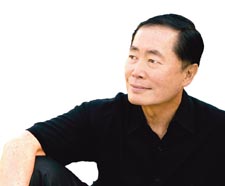
MW: What other groups or causes are dear to you?
TAKEI: I’ve been involved with the Civil Rights Movement from the ’60s. We sang at many rallies, one where Dr. Martin Luther King Jr. spoke. We marched with him.
Through that, I got involved in the movement to get redress for Japanese Americans who were incarcerated unconstitutionally during the Second World War, simply because we happened to look like the people who bombed Pearl Harbor. With no charges, no trials, no due process, we were summarily rounded up. I still remember that day when soldiers with bayoneted rifles came to our front door to order our family out.
I was a child then so I had no understanding of what was happening around me. I remember my parents were in urgent conversation and my mother was teary eyed frequently. Certainly I was scared when the soldiers came to get us. After we were ordered out of our homes, we were taken to the horse stables at a nearby racetrack, Santa Anita. I think about my parents, a young couple with three children, losing everything — my father’s business, the home, freedom. When the construction [of the camps] was completed, we were put on a train a carted two-thirds of the way across the country to the swamps of Arkansas. Barbed-wire fence, sentry towers, machine guns pointed at us. The euphemism then was ”relocation center.” ”Internment camp” is more specific. But for all intents and purposes, it was a ”concentration camp.” The Jewish community were put into ”death camps” in Germany and Poland. We were concentrated behind barbed-wire fences, so it was a concentration camp. Thank God the war didn’t go badly, but you kind of speculate on what might have happened if the war had turned badly for the United States.
The other irony is that there were thousands of young Japanese-American men who went from behind those barbed-wire fences to prove how American they were, leaving their families, loved ones, behind those barbed-wire fences, and fought for this country. A Japanese-American unit was part of the force that liberated the Dachau camp in Germany.
MW: Can you point to that experience as doing more to shape your values, sensibilities, than any other?
TAKEI: The internment was a tremendous shaping force because I saw how my father struggled to get back on his feet and the extraordinary effort he made to educate three children, to put them through great universities in this country. He was the one who suffered the most, yet he was able to put it in a larger philosophic and idealistic context.
He said both the strengths and weaknesses of American democracy lie in the fact that it is a true people’s democracy. It could be as great as a people can be, but as fallible as a people are. People gave into hysteria at the time of the bombing of Pearl Harbor. The whole government reacted hysterically.
MW: Do you see parallels to that today?
TAKEI: Absolutely. Right after 9/11, in the plaza in front of our Japanese-American National Museum, we held a candlelight vigil and we invited leaders from the Arab-American community as well as some of the older Japanese-Americans who remembered the imprisonment here in the United States. They spoke out on the importance of our learning from the internment of Japanese-Americans and not letting it happen again. We held a symposium, inviting leaders from the Arab-American community, the Japanese-American community, representatives from the Los Angeles County Sheriff’s Department, and a representative from the County Human Relations Commission. We also extended an invitation to the FBI. They demurred.
MW: Despite seeing some echo of history repeating itself, with your eyes on the future you must see progress, too, like how far GLBT civil rights have advanced.
TAKEI: Yes, it is changing. And I feel that I am in a position where I can contribute — maybe not much — by being on Howard Stern. There are a lot of gays and lesbians who listen to Howard Stern, but the majority of the audience is made up of people who really don’t think about issues of equality.
By being on [the show] and talking about my relationship with Brad and making it as normal and sometimes boring and as irritating as straight relationships, people say, ”Oh, yeah.”
So I can make my contribution to thinking about the issues of equality and how unfair, how unjust, some of our laws are that are shaped by religious beliefs. I believe in a strict separation of church and state, and yet so many of our laws that govern everybody are influenced and shaped by religious prejudices. In a straight couple, the surviving member of the couple can enjoy the benefit of the pension the deceased had. That can’t happen with Brad and me.
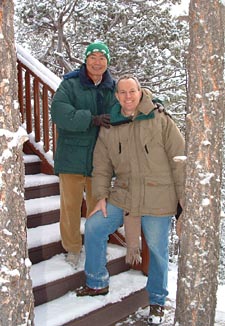
MW: You and Brad Altman have been together for 21 years. Do you know the secret to domestic bliss?
TAKEI: Sometimes we do have arguments — and we do have intense arguments — but we always go to bed with a kiss. We may still be fuming, but as a ritual we kiss each other. Somehow, when you do that, it all falls into place. We see how really unimportant or how insignificant our differences are. What really counts is that we love each other.
George Takei will narrate the Baltimore Symphony Orchestra’s SuperPops production of ”Sci-Fi Spectacular,” January 17, at 8 p.m. at the Music Center at Strathmore in Rockville, and January 18-19 at 8 p.m. and January 20 at 3 p.m. at the Joseph Meyerhoff Symphony Hall in Baltimore. Tickets range from $15 to $84. Call 877-BSO-1444 or 410-783-8000. For more information, visit BSOmusic.org.
Support Metro Weekly’s Journalism
These are challenging times for news organizations. And yet it’s crucial we stay active and provide vital resources and information to both our local readers and the world. So won’t you please take a moment and consider supporting Metro Weekly with a membership? For as little as $5 a month, you can help ensure Metro Weekly magazine and MetroWeekly.com remain free, viable resources as we provide the best, most diverse, culturally-resonant LGBTQ coverage in both the D.C. region and around the world. Memberships come with exclusive perks and discounts, your own personal digital delivery of each week’s magazine (and an archive), access to our Member's Lounge when it launches this fall, and exclusive members-only items like Metro Weekly Membership Mugs and Tote Bags! Check out all our membership levels here and please join us today!










